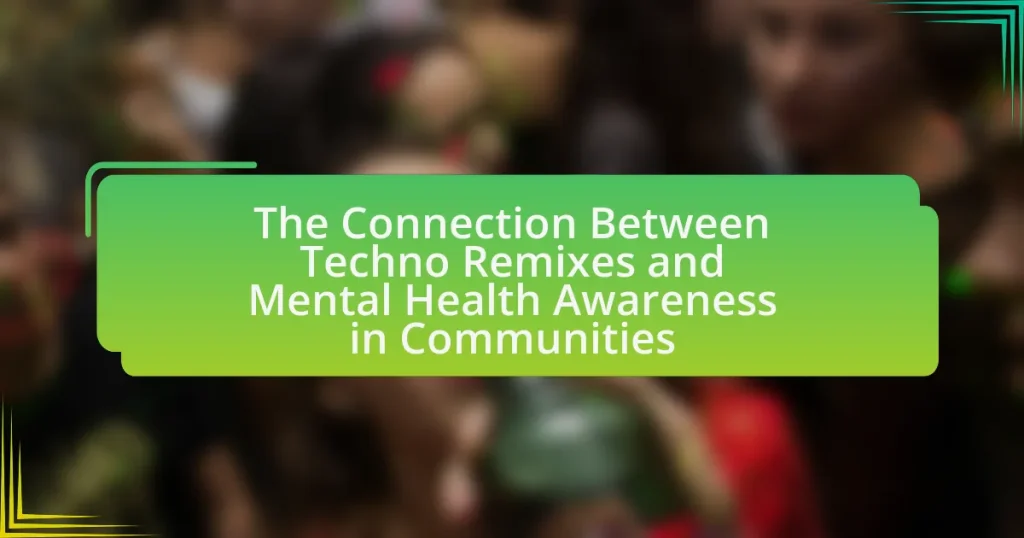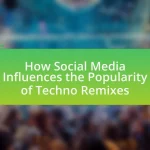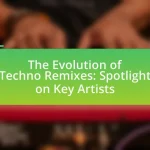The article explores the connection between techno remixes and mental health awareness in communities, highlighting how this genre of music fosters inclusive spaces for expression and connection. It discusses the therapeutic potential of techno music, emphasizing its ability to enhance mood, reduce feelings of isolation, and promote dialogue about mental health issues. Key elements such as the immersive soundscapes and communal experiences of techno remixes are examined, along with their role in community events aimed at raising mental health awareness. The article also addresses challenges and misconceptions surrounding techno music, while proposing strategies for leveraging this genre to improve mental health outreach and engagement within communities.
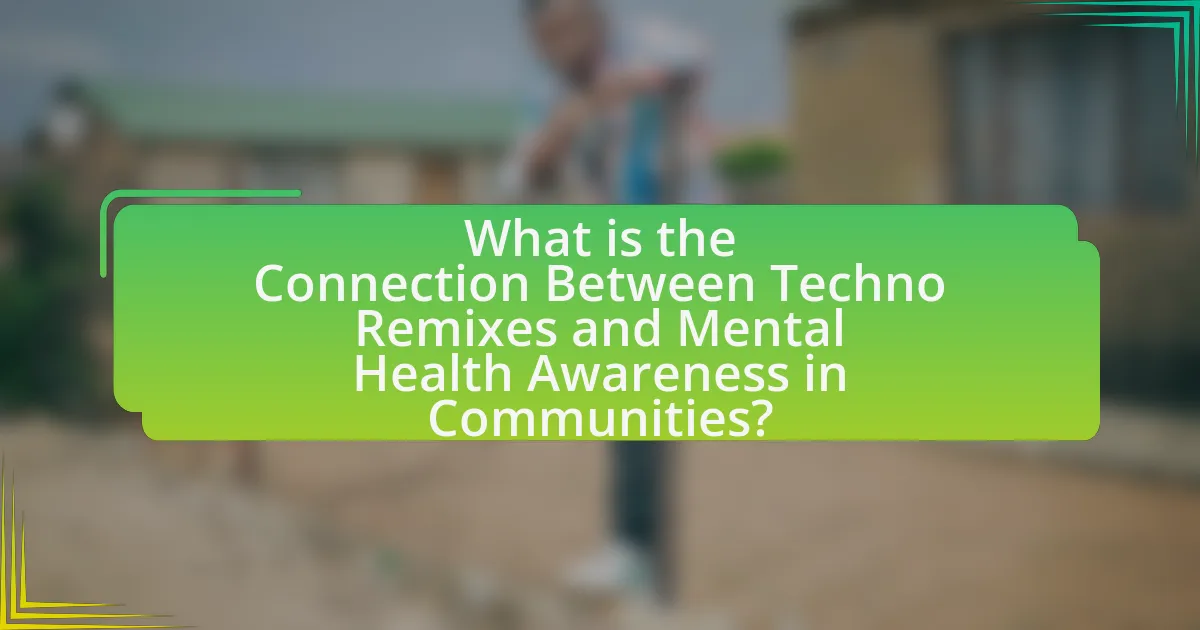
What is the Connection Between Techno Remixes and Mental Health Awareness in Communities?
Techno remixes play a significant role in promoting mental health awareness in communities by creating inclusive spaces for expression and connection. These remixes often incorporate uplifting beats and lyrics that resonate with listeners, fostering a sense of belonging and community support. Research indicates that music, particularly genres like techno, can enhance mood and reduce feelings of isolation, which are critical factors in mental health. For instance, a study published in the Journal of Music Therapy found that engaging with music can lead to improved emotional well-being and social interaction, highlighting the therapeutic potential of techno music in community settings.
How do techno remixes influence mental health awareness?
Techno remixes influence mental health awareness by providing a platform for expression and community engagement, which can foster discussions about mental health issues. The energetic and immersive nature of techno music often creates environments where individuals feel safe to share their experiences and struggles, thereby normalizing conversations around mental health. Research indicates that music, including genres like techno, can significantly impact emotional well-being, with studies showing that participation in music events can reduce feelings of isolation and anxiety. For instance, a study published in the Journal of Music Therapy found that group music-making activities can enhance social connections and improve mental health outcomes. Thus, techno remixes serve as a catalyst for raising awareness and promoting dialogue about mental health within communities.
What elements of techno music contribute to mental health discussions?
Techno music contributes to mental health discussions through its repetitive beats, immersive soundscapes, and communal experiences. The repetitive nature of techno can induce trance-like states, which have been linked to stress relief and emotional release. Additionally, the genre often emphasizes themes of unity and connection, fostering a sense of belonging among listeners and participants in events. Research indicates that music, including techno, can significantly impact mood and emotional well-being, with studies showing that rhythmic music can enhance feelings of happiness and reduce anxiety. These elements collectively create a platform for dialogue about mental health, encouraging individuals to share their experiences and seek support within the community.
How do remixes enhance the emotional impact of techno music?
Remixes enhance the emotional impact of techno music by reinterpreting original tracks, allowing for new emotional expressions and connections. This transformation often incorporates varied tempos, altered melodies, and additional layers of sound, which can evoke different feelings and memories in listeners. For instance, a remix may slow down a track to create a more introspective atmosphere, while another might intensify the beat to energize and uplift. Research indicates that music remixes can stimulate emotional responses by engaging listeners in a familiar yet novel auditory experience, thereby fostering a deeper connection to the music and its themes. This connection is particularly significant in the context of mental health awareness, as emotionally resonant music can serve as a therapeutic tool, promoting emotional expression and community bonding.
Why is mental health awareness important in communities?
Mental health awareness is important in communities because it fosters understanding, reduces stigma, and encourages individuals to seek help. Increased awareness leads to better mental health outcomes, as studies show that communities with strong mental health education programs experience lower rates of mental illness and improved overall well-being. For instance, a report by the World Health Organization indicates that mental health literacy can significantly enhance the ability of individuals to recognize mental health issues and seek appropriate support, ultimately leading to healthier communities.
What role does community play in mental health support?
Community plays a crucial role in mental health support by providing social connections, resources, and a sense of belonging. These elements are essential for individuals facing mental health challenges, as they foster emotional resilience and reduce feelings of isolation. Research indicates that strong community ties can lead to improved mental health outcomes; for instance, a study published in the American Journal of Public Health found that individuals with supportive social networks are less likely to experience depression and anxiety. Furthermore, community initiatives, such as support groups and awareness campaigns, enhance access to mental health resources, promoting early intervention and reducing stigma associated with mental health issues.
How can music serve as a tool for mental health advocacy?
Music can serve as a powerful tool for mental health advocacy by raising awareness, fostering community support, and providing therapeutic benefits. Through lyrics that address mental health issues, artists can spark conversations and reduce stigma, as seen in songs like “1-800-273-8255” by Logic, which directly references suicide prevention. Additionally, music events and festivals often promote mental health resources, creating safe spaces for individuals to connect and share experiences. Research indicates that music therapy can effectively reduce symptoms of anxiety and depression, further highlighting its role in mental health advocacy.
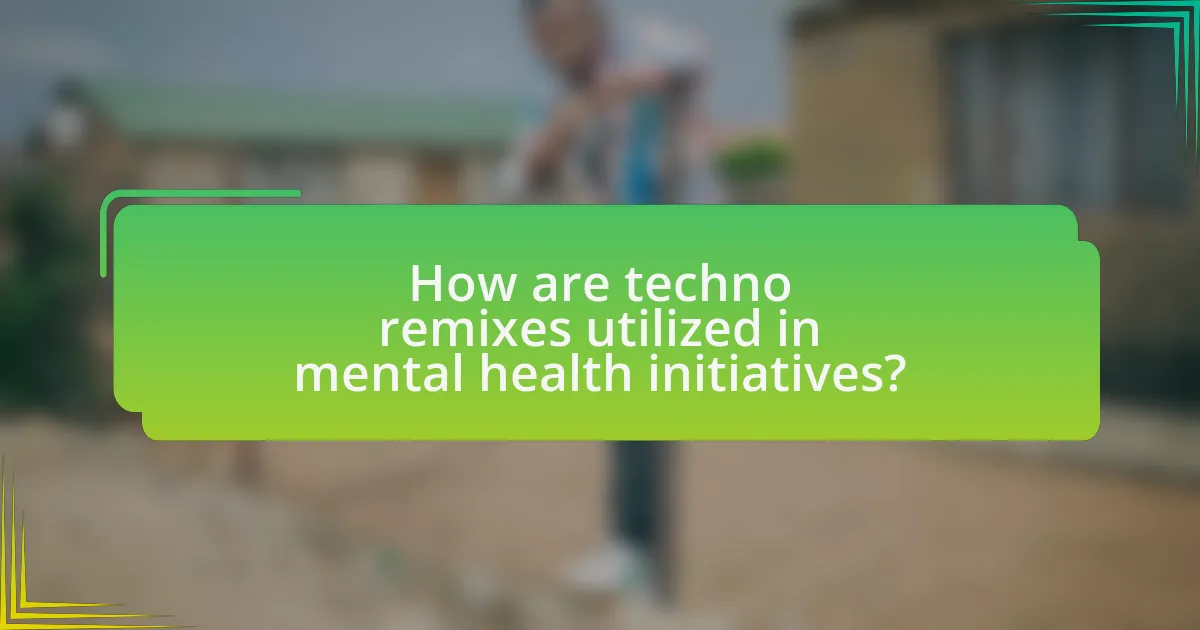
How are techno remixes utilized in mental health initiatives?
Techno remixes are utilized in mental health initiatives primarily as therapeutic tools to enhance emotional well-being and foster community engagement. These remixes often incorporate rhythmic beats and uplifting melodies that can promote positive emotions, reduce anxiety, and facilitate social connections during events like music therapy sessions or community gatherings. Research indicates that music, including techno, can stimulate the release of dopamine, a neurotransmitter associated with pleasure and reward, thereby improving mood and mental health outcomes. For instance, a study published in the Journal of Music Therapy found that participants who engaged with rhythmic music experienced significant reductions in stress and anxiety levels.
What types of events feature techno remixes for mental health awareness?
Events that feature techno remixes for mental health awareness include music festivals, charity raves, and community wellness events. These gatherings often incorporate techno music as a means to create an uplifting atmosphere while promoting discussions around mental health. For instance, festivals like “Awakenings” and charity raves organized by groups such as “Dance for Mental Health” specifically aim to raise funds and awareness for mental health initiatives through the medium of techno music.
How do festivals and parties promote mental health messages through music?
Festivals and parties promote mental health messages through music by creating an inclusive environment that fosters community connection and emotional expression. Music at these events often features lyrics and themes that address mental health issues, encouraging open discussions and reducing stigma. For instance, studies have shown that participation in music festivals can lead to increased feelings of belonging and decreased anxiety, as evidenced by a 2018 study published in the Journal of Positive Psychology, which found that group music-making activities significantly improved participants’ mental well-being. Additionally, many festivals collaborate with mental health organizations to provide resources and support, further amplifying their message and impact on attendees.
What are the benefits of using techno remixes in therapeutic settings?
Techno remixes offer several benefits in therapeutic settings, primarily by enhancing mood and facilitating emotional expression. The rhythmic and repetitive nature of techno music can promote relaxation and reduce anxiety, as evidenced by studies showing that music with a steady beat can lower cortisol levels, a stress hormone. Additionally, techno remixes often encourage movement and dance, which can serve as a form of physical therapy, improving motor skills and coordination. Research indicates that engaging with music, particularly in a communal setting, fosters social connections, which are crucial for mental health. Furthermore, the immersive experience of techno remixes can help individuals access and process emotions, making it a valuable tool in therapeutic practices.
How do community responses to techno remixes shape mental health perceptions?
Community responses to techno remixes significantly shape mental health perceptions by fostering a sense of belonging and collective identity among listeners. This genre often serves as a platform for expressing emotions and experiences related to mental health, which can lead to increased awareness and destigmatization. For instance, studies have shown that music, including techno, can act as a therapeutic tool, promoting emotional release and community support. Research published in the Journal of Music Therapy indicates that communal music experiences can enhance social connections and improve mental well-being, thereby influencing how individuals perceive mental health issues within their communities.
What feedback do communities provide regarding techno music and mental health?
Communities generally provide positive feedback regarding the impact of techno music on mental health, often highlighting its role in promoting emotional well-being and social connection. Many individuals report that techno music creates an immersive experience that facilitates emotional release and reduces feelings of anxiety and depression. Research indicates that participation in techno music events can foster a sense of belonging and community, which is crucial for mental health. For instance, a study published in the Journal of Music Therapy found that rhythmic music, including techno, can enhance mood and alleviate stress, supporting the notion that such music can be beneficial for mental health.
How do local artists contribute to mental health awareness through their remixes?
Local artists contribute to mental health awareness through their remixes by incorporating themes of emotional struggle and resilience into their music, which resonates with listeners. These remixes often feature lyrics or soundscapes that reflect personal experiences with mental health issues, fostering a sense of community and understanding among fans. For instance, studies have shown that music can serve as a therapeutic tool, with remixes providing a platform for dialogue about mental health, thereby reducing stigma. Additionally, local artists frequently collaborate with mental health organizations to promote awareness campaigns, using their remixes as a medium to reach wider audiences and encourage open conversations about mental well-being.
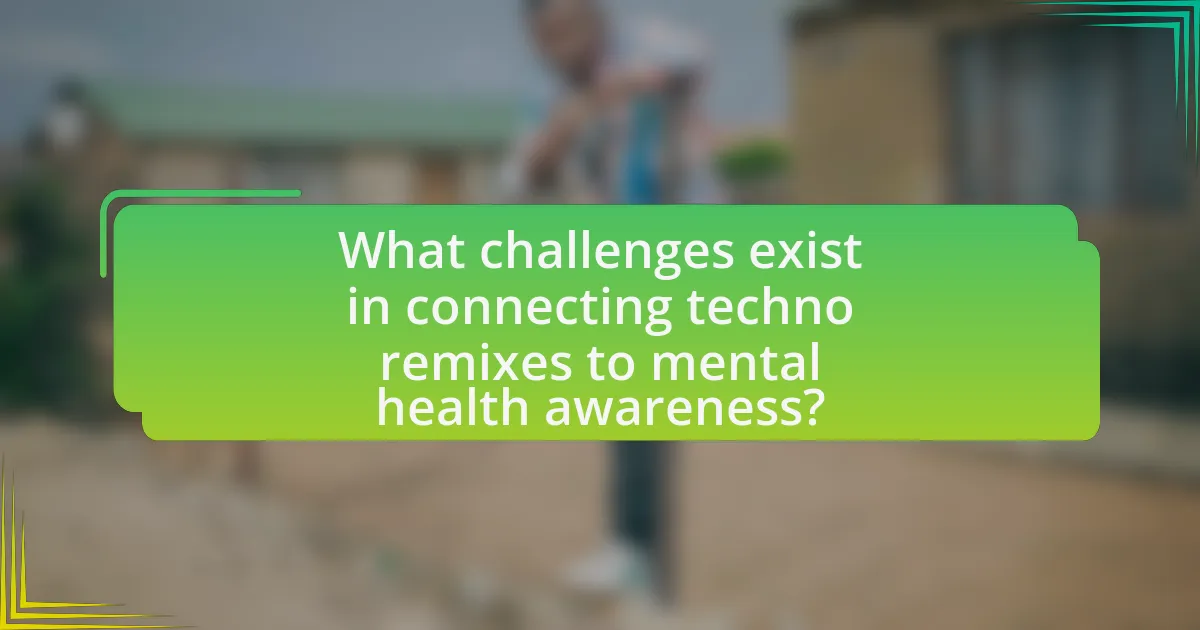
What challenges exist in connecting techno remixes to mental health awareness?
Connecting techno remixes to mental health awareness faces several challenges, primarily due to the genre’s association with nightlife culture and substance use. This association can overshadow the positive mental health messages intended to be conveyed through remixes. Additionally, the lack of structured platforms for artists to share mental health narratives within the techno community limits outreach. Research indicates that music can influence emotional states, yet the techno genre often emphasizes escapism rather than introspection, making it difficult to foster meaningful discussions about mental health. Furthermore, the diversity of the audience means varying levels of receptiveness to mental health topics, complicating efforts to create a unified message.
What misconceptions about techno music affect mental health initiatives?
Misconceptions about techno music, such as the belief that it promotes substance abuse and is solely associated with nightlife, negatively impact mental health initiatives by stigmatizing the genre and its community. These misconceptions lead to a lack of support for mental health programs that could benefit from engaging with techno culture, which has been shown to foster community and emotional expression. Research indicates that music, including techno, can serve as a therapeutic tool, enhancing well-being and reducing anxiety when integrated into mental health strategies. By failing to recognize the positive aspects of techno music, mental health initiatives may overlook valuable opportunities for outreach and support within this demographic.
How can stigma surrounding mental health hinder community engagement?
Stigma surrounding mental health can significantly hinder community engagement by creating barriers to open communication and participation. Individuals may avoid seeking help or engaging in community activities due to fear of judgment or discrimination, which can lead to isolation and decreased social cohesion. Research indicates that communities with high levels of stigma experience lower rates of participation in mental health initiatives, as individuals are reluctant to disclose their struggles or support others facing similar challenges. For instance, a study published in the “Journal of Community Psychology” found that stigma negatively impacts community members’ willingness to engage in mental health programs, ultimately reducing the effectiveness of these initiatives.
What barriers do organizers face when promoting mental health through music?
Organizers face several barriers when promoting mental health through music, including stigma, funding limitations, and audience engagement challenges. Stigma surrounding mental health can deter individuals from participating in events, as they may fear judgment or misunderstanding. Additionally, securing funding for mental health initiatives in music events is often difficult, as sponsors may prioritize more mainstream or commercially viable projects. Furthermore, engaging audiences effectively requires careful messaging and programming that resonates with diverse community members, which can be complex and resource-intensive. These barriers hinder the successful promotion of mental health awareness through music initiatives.
How can communities effectively leverage techno remixes for mental health awareness?
Communities can effectively leverage techno remixes for mental health awareness by organizing events that feature these remixes as a medium for promoting discussions around mental health. Such events can create an engaging atmosphere where participants feel comfortable sharing their experiences and learning about mental health resources. Research indicates that music, particularly genres like techno, can influence emotional states and foster community bonding, which is essential for mental health support. For instance, a study published in the Journal of Music Therapy found that music can reduce anxiety and improve mood, making it a powerful tool for awareness campaigns. By integrating techno remixes into workshops, festivals, or online platforms, communities can enhance outreach and create a supportive environment that encourages open dialogue about mental health issues.
What strategies can be implemented to enhance community involvement?
To enhance community involvement, strategies such as organizing local events, fostering partnerships with local organizations, and utilizing social media for outreach can be implemented. Local events, like workshops or festivals, create opportunities for residents to engage with one another and share experiences, thereby strengthening community ties. Partnerships with organizations, such as mental health services or educational institutions, can provide resources and expertise, facilitating programs that address community needs. Additionally, social media platforms can be leveraged to disseminate information, gather feedback, and encourage participation in community initiatives, as evidenced by studies showing increased engagement through digital communication channels.
How can partnerships with local artists improve mental health outreach?
Partnerships with local artists can enhance mental health outreach by creating engaging and relatable content that resonates with the community. Artists often have a unique ability to express complex emotions and experiences through their work, making mental health topics more accessible and less stigmatized. For instance, community art projects or performances can foster dialogue about mental health, encouraging individuals to share their experiences and seek help. Research indicates that creative expression can significantly reduce anxiety and depression, highlighting the therapeutic benefits of art in mental health initiatives. By collaborating with local artists, mental health organizations can leverage these benefits to reach a broader audience and promote awareness effectively.
What are practical tips for promoting mental health awareness through techno remixes?
To promote mental health awareness through techno remixes, artists and event organizers should incorporate mental health themes into their music and visuals. This can be achieved by using lyrics that address mental health issues, creating remixes that evoke emotions related to mental well-being, and collaborating with mental health organizations to spread awareness. For instance, events can feature informational booths or workshops on mental health alongside performances, fostering a supportive environment. Additionally, social media campaigns can be launched to share personal stories and resources, encouraging community engagement and dialogue about mental health. Research indicates that music can significantly impact emotional states, making it a powerful tool for raising awareness and reducing stigma surrounding mental health.
